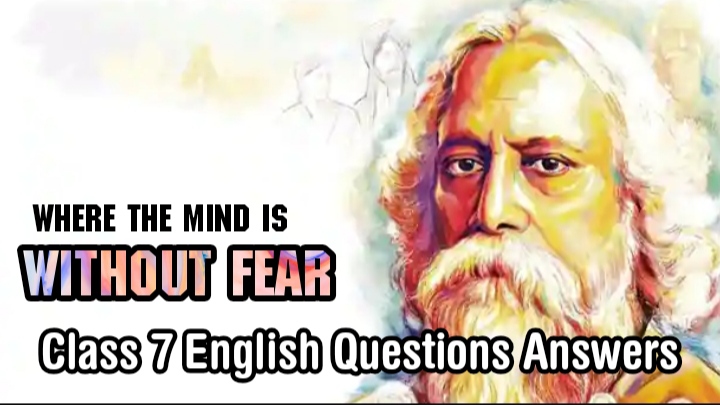Where The Mind is Without Fear class 7 English Questions Answers
Where The Mind is Without Fear class 7 English Questions Answers : Where The Mind is Without Fear is the poem composed by Rabindranath Tagore during the time when India was under the British Rule and people were eagerly waiting to get their freedom. Here you'll get to read Where The Mind is Without Fear class 7 English Questions Answers.
The poem "Where the Mind is Without Fear" was included in the volume called Naibedya. The poem is a prayer to God to protect the nation from evil effects.
It is a prayer to the Almighty for a nation free from any kind of manipulative or corrupt powers. This poem is a reflection of the poet’s good and ideal nature. In this poem the poet Rabindranath Tagore depicts the picture of a new and awakened India.
Where The Mind is Without Fear class 7 Poem
Where The Mind is Without Fear
Where the mind is without fear and the head is held high;
Where knowledge is free;
Where the world has not been broken up into fragments
By narrow domestic walls;
Where words come out from the depth of truth;
Where tireless striving stretches its arms towards perfection;
Where the clear stream of reason has not lost its way into
the dreary desert sand of dead habit;
Where the mind is led forward by thee into ever-widening
thought and action
Into that heaven of freedom, my father, let my country awake.
Rabindranath Tagore
Where The Mind is Without Fear Summary in English
The poet prays to God to make his country a heaven of freedom where people live with dignity and without fear. He wishes that people of his country are not divided by narrow considerations of caste and creed.
He wishes people to be truthful and they are not slaves to dead customs and habits. He prays to God with all his heart that he should guide the countrymen to work hard, speak the truth, be forward and logical in approach. They should ever be making tireless effort to attain perfection. He aspires to see his country and people in peace and prosper.
Where The Mind is Without Fear Summary in Hindi
कवि ईश्वर से प्रार्थना करता है कि वह अपने देश को स्वतंत्रता का स्वर्ग बनाए जहां लोग सम्मान के साथ और बिना किसी भय के रहें। वह चाहता है कि उसके देश के लोग जाति और पंथ के संकीर्ण विचारों से विभाजित न हों।
वह चाहता है कि लोग सच्चे हों और वे मृत रीति-रिवाजों और आदतों के गुलाम न हों। वह पूरे दिल से ईश्वर से प्रार्थना करता है कि वह देशवासियों को कड़ी मेहनत करने, सच बोलने, आगे बढ़ने और दृष्टिकोण में तार्किक होने के लिए मार्गदर्शन करे। सिद्धि प्राप्त करने के लिए उन्हें सदैव अथक प्रयास करते रहना चाहिए। वह अपने देश और लोगों को शांति और समृद्धि में देखना चाहता है।
Where The Mind is Without Fear class 7 Solutions English
Exercises
I. (a) Let's look at the interesting use of the relative adverb 'where' in all but 1 line of the poem. The lines start with 'where
Line 1 Where the mind is without fear and the head is held high;
Here 'where' relates to 'mind' and now find out what 'where' relates to lead' in the other lines.
Ans: In the other line, 'Where' the mind is led forward into ever-widening thought and action.
(b) Find out the negative words in the poem, eg, fear, broken.
Ans: The other negative words in the poem are: narrow, lost, dreary, dead.
(c) Say whether true or false
i. The poet describes an ideal place
ii. Narrow domestic walls mean a lack of understanding between man and man.
iii. 'Dead habit' means old habits.
iv. Truth, perfection, and reason are not to be found in that 'heaven'
v. Tireless striving cannot reach perfection.
Ans: i. True ii. True iii. True iv. False v. False
II. Give 5 short sentences to describe the heaven that the poet wants for his country men eg. a place where knowledge is free
Ans: (i) Where mind is without fear.
(ii) Where everyone speaks only truth.
(iii) Where people use reasons over their blind faiths.
(iv) Where mind is lead by thought and action.
(v) Where everyone works tirelessly towards perfection.
Sankardev Shishu Niketan Class 7 English Solutions
III. Answer the following:
1. Who does 'thee' refer to ?
Ans: Here, in this poem 'thee' refers to God.
2. What does the poet expect a man to possess ?
Ans: The poet expects a man to possess freedom and happier future for mankind.
3. How can one achieve perfection ?
Ans: By striving tirelessly one can achieve perfection.
4. What is a 'dead habit' ?
Ans: Here in this poem by the term 'Dead Habit' poet means 'Old habit' of blind faith. People need to use their reasons over the blind faiths and must accept new thoughts and ideas.
5. What are 'narrow domestic walls ?
Ans: Narrow Domestic walls means Prejudice, blind faith, superstitions and inability of understanding.
6. Does this poem remind you of any poem of Bengali poet Rabindranath Tagore ?
Ans: Yes this poem reminds me of "Freedom of thought' another famous poem of Rabindra Nath Tagore.
7. The word Where' is frequently used in this poem. Why ?
Ans: In this poem the word 'where' is frequently used, because the poem is a description of a place which is imagined by the poet and he indicates it by using the word 'where'.
Class 7 English Text-Book's other lessons








No comments:
Post a Comment
Kindly donnot paste any SPAM link. Thank you very much for reading, Happy learning.